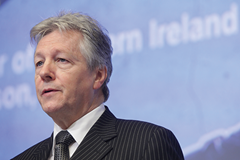Northern Ireland’s European priorities
 Economic development is the major focus of the Executive’s European policy but ministers are also welcoming a new Peace IV funding programme.
Economic development is the major focus of the Executive’s European policy but ministers are also welcoming a new Peace IV funding programme.
Northern Ireland is one of 271 regions in the European Union and is relatively small by continental standards. However, the Troubles and the peace process have given it a profile that it would not otherwise have had.
European Commission President Jacques Delors approved the first Peace funding in 1994 and his successor, José Manual Barroso, established a dedicated task force (unique for an EU region) to support devolution in 2007.
The Executive’s European policy is handled by OFMDFM, which has set out four broad priorities for 2012-2013:
• competitiveness and employment;
• innovation and technology;
• climate change and energy; and
• social cohesion.
As expected, the economy is the highest priority. Policy work in this area involves negotiating with the European Commission to maximise the level of regional aid (new guidelines will take effect this year) and drawing down support from relevant funding programmes e.g. the European Social Fund.
Alongside that, the Executive encourages local students to participate in the Erasmus exchange programme and promotes the province as a tourist destination to other Europeans.
Northern Ireland’s performance in innovation is near average in UK terms but well below the levels achieved by Finland and Sweden.
Agriculture and health are seen as key growth sectors and officials are taking part in European networks to promote Northern Ireland’s expertise. The reformed Common Agricultural Policy is expected to open up more opportunities for R&D. Invest NI sits on the UK steering group for the Horizon 2020 R&D programme, which commences in 2014.
The Europe 2020 strategy for economic growth includes funding for low carbon projects, which can help the province deal with its climate change and energy challenges. CAP reform will also seek to reduce agriculture’s carbon footprint.
‘Social cohesion’ covers the community relations, equality and anti-poverty elements of the Programme for Government.
Securing European recognition for the Maze/Long Kesh project was a major success; the Commission has pledged €18.1 million (£15.6 million) towards the development. Northern Ireland’s experience of conflict resolution has been shared through the political parties themselves (e.g. Sinn Féin and the Basque Country), the public sector consultancy NI-CO and the wider voluntary sector.
The Executive has set itself a target of drawing down £13.2 million in competitive funding in 2012-2013. Last year,
£15.8 million was secured, an increase from £10.9 million in 2010-2011.
Ministers and MEPs have welcomed a Peace IV funding package (up to
£150 million) to cover the 2014-2020 period. However, this may be limited by the UK Government policy which favours a cut in the overall EU budget.
OFMDFM views the European Union pragmatically, mainly as an opportunity for obtaining funding and raising Northern Ireland’s positive profile. Both main parties in the Executive are Euro-sceptic, with the DUP calling for a British withdrawal from the EU and the Sinn Féin opposing further integration. The DUP points out that the UK is a net contributor to EU funds and contends that Northern Ireland would benefit if this money was returned to Westminster.





